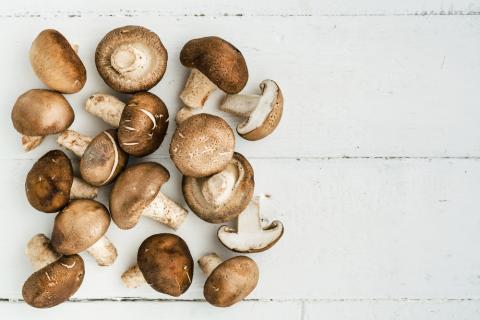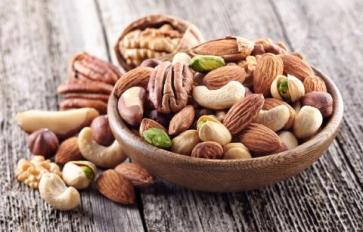
Button mushrooms don’t get the respect they deserve. They’re often thought to be good for nothing but slapping on top of a pizza. But read on for a different story…
1. Button mushrooms are very nutritious.
They contain selenium, vitamin B12, vitamin D2, and a variety of other vitamins and minerals. They’re also high in fiber and good quality protein (sometimes up to 80% protein by dry weight).
2. Button mushrooms promote healthy blood sugar levels.
Studies show that button mushrooms are capable of reducing blood sugar levels. Part of this may be due to the fiber that buttons and other mushrooms contain. Fiber slows the release of sugar into the bloodstream after meals and also has beneficial effects on our resident gut microbes, which also have a hand in regulating our circulating sugar levels. Aside from fiber content, button mushrooms may also help to increase storage of sugar (as glycogen) in the liver, reducing circulating levels and saving it for when it’s really needed. And, if that weren’t enough, research has found that button mushrooms influence insulin secretion in pancreatic cells. Insulin is what allows many of our cells to take up blood sugar and it’s made in the pancreas.
3. Button mushrooms support cardiovascular health.
Button mushrooms keep our heart ticking by directly supporting the heart itself as well as the health of our blood vessels. First, the mushrooms have been found to reduce blood pressure, at least in part by acting as what’s known as an ACE inhibitor. Some of you may be familiar with pharmaceutical ACE inhibitors that reduce blood pressure, but a variety of mushrooms also have this activity, though to varying extents. They also support healthy cholesterol regulation: reducing total cholesterol levels in circulation, increasing LDL binding in the liver (out of circulation), and reducing the fat accumulation in the liver that can happen with high blood lipid levels.
As mentioned, button mushrooms are high in fiber, which also helps with healthy cholesterol regulation. Another way button mushrooms may keep our blood vessels happy is by reducing their “stickiness”. Certain “adhesion” molecules hang out on the surface of cells lining our blood vessels when there is chronic inflammation in the body. These molecules grab onto all sorts of things…platelets, rancid cholesterol, etc., and can cause blockages. Button mushrooms reduce the presence of these adhesion molecules.
4. Button mushrooms have antioxidant activity.
Free radicals essentially cause rust (“oxidative stress”) in the body, contributing to all of our chronic diseases and to aging. Button mushrooms have antioxidant effects that protect our cells. This is also relevant to blood vessel health. Oxidative stress and the resulting damage and inflammation is a major reason for clogging of the arteries. Cholesterol is sent into circulation to protect the damaged area then itself becomes oxidized and sticky in a process that will eventually block flow through the vessel. Eating button and other mushrooms regularly, in the context of a healthy diet, is a great way to get to the root of the issue.
5. Button mushrooms have various anti-tumor effects.
A couple of studies have found button mushrooms to have benefits for folks dealing with cancer. In one, consumption of as little as 10 grams of mushrooms daily reduced breast cancer incidence in women. 10 grams is less than one mushroom. In the other study, button mushroom powder improved immune system function and reduced a marker of prostate growth in men with recurrent prostate cancer.
More mechanistic studies have found a variety of effects on the immune system that may be beneficial with respect to cancer and overall health. And button mushroom extracts are able to block the activity of an enzyme called aromatase. Aromatase is a key enzyme in the production of estrogen, and it is overproduced in estrogen-responsive breast cancer cells so that the tumor drives its own growth by increasing estrogen levels. Drugs that inhibit aromatase are already in clinical use, but why not do a little preventative work by eating tasty mushrooms?
You may have seen online concerns about a chemical in button mushrooms called agaritine. Purified agaritine caused cancer in rodents when fed to them in levels much higher than you’d get from eating a regular serving of mushrooms on a regular basis. There was an older study that found feeding raw button mushrooms to rodents as a very large part of their diet (1/3 mushrooms, 2/3 whatever else they feed lab rats) every day over their lifetime resulted in increased cancer incidence. Again, this doesn’t reflect the much lower level of exposure you’d get from simply eating them as part of your diet a few times a week or even more. In fact, recent studies that fed rodents button mushroom extracts showed no problem whatsoever. If you’re worried, note that storage of button mushrooms in the fridge for a few days significantly reduces agaritine levels (they’ve already been refrigerated for a while by the time you bring them home). And, cooking reduces levels by another 20% or so, if there’s any left after the fridge. Note that either way, it’s not a great idea to eat raw button mushrooms…but I’m more worried about the lack of digestibility when raw than anything else.
Finally, if you think the flavor of buttons is boring…try dry sautéing them…it’s a whole new game!








